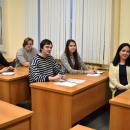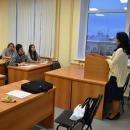Study course “The concept of the Europe’s Union in the European socio-political thought in the modern and contemporary times”
The Associate Professor of the Department of World History, Political Studies and International Relations Natalia Smirnova read the course “The concept of the Europe’s Union in the European socio-political thought in the modern and contemporary times” for the 5th year Master Degree students of the “History” program specializing in “United Europe: from the idea of ancient empire to the European Union”.
The aim of the course was to enrich the knowledge of the concepts behind the European integration, history of the EU development, analysis of the practical implementation of the European idea in the 19th – 20th centuries. The goals of the course: study the treatises of thinkers from the Renaissance era to the points of view of Eurosceptics and Eurooptimists in the beginning of the 21st century; analysis of the evolution of the European idea in history: humanistic and pacifist movements in Europeanism; Eurocentrism and universalism. The prime objective of the supporters of the European idea is to establish a proper united Europe, which will include all the peoples residing in the region in a single political, cultural, social and economic area. Modern European integration process is an attempt to translate the ideas of thinkers and politicians into action. The European integration architecture reflects the institutional ideas of Duke of Sully, William Penn, and Richard Coudenhove-Kalergi: the humanitarians’ vision of peace as the supreme value that unites all the peoples. The Enlightenment era enriched modern integrated Europe with the ideas of universalism, tolerance, and state of law, while the ideas of Emeric Cruce on the role of trade and crafts were successfully tested during the establishment of the Economic and Monetary Union. On the other hand, the history of the European idea showed that excessive focus on the cultural unity of the European peoples can turn into Eurocentrism, creation of the “Europe Castle” and, as it has happened before in the European history, lead to the rise of race and ethnic intolerance of those peoples who do not match the selected criteria of “Europeanness”. Attempts to forcefully unify Europe have always foundered. The cases of Napoleon and the Nazi project of the “New Europe” stand as evidence to the impossibility of uniting Europe under the reign of one hegemon.
The topics of the course: secular European projects of the united Europe in the Middle Ages and Modern Times; colonial empires and concepts of European exceptionalism; “European idea” and European projects of Modern Times; the Renaissance era; European projects of the 19th century: Napoleon’s vision of united Europe; at the threshold of integration process: European projects of the first half of the 20th century; founding fathers of the EU; European social and political thought on the experience and future of the integration in the end of the 20th – the beginning of the 21st century.




<<< back


